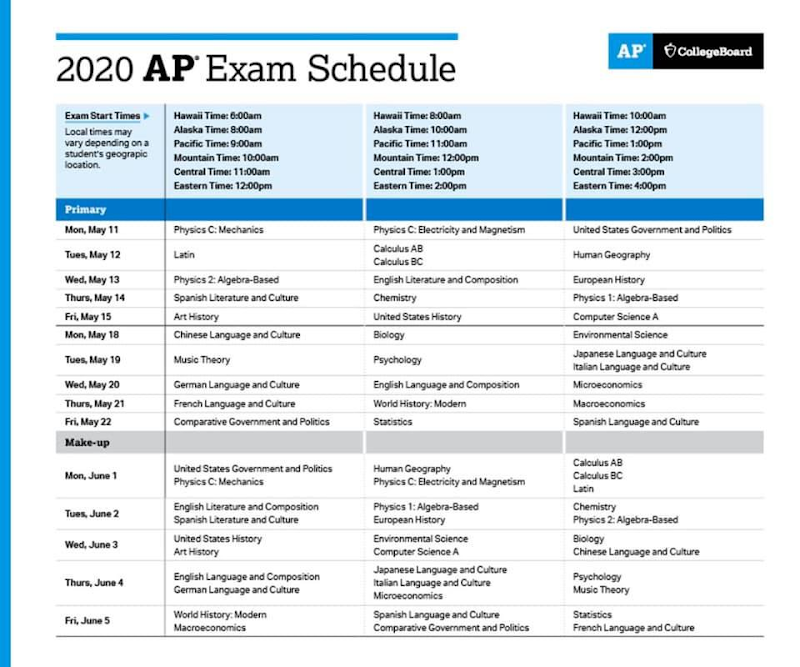AP students have mixed feelings about online exams
April 6, 2020
On Monday, March 16th, the College Board announced that it was in its beginning stages of creating enhancement materials and opportunities for SAT, and AP test takers to continue preparing for these exams. After the decision to close schools in most states as a response to COVID-19, this organization is one of many forced to re-evaluate how it will promote flexible learning for high school students internationally.
By March 20th, the College Board officially stated that all scheduled AP exams would now be taken online and from home, and would be only 45 minutes long. The exams will also only cover topics discussed in most classrooms before early March, testing students just on what was done before social distancing was put into place. “Our focus will remain on your safety and ensuring all students have the tools they need to work, and opportunities to receive the credit they have earned, during this challenging time,” the College Board said on its social media platforms. Though most students are grateful for the chance to finish their courses and take the test, differences with this year’s exam have brought into question the validity of allowing such an important score to be administered virtually.
Simply stated, many students are fearful that access to technology, notes, and open communication with peers will lead to an exponential increase in cheating. Though the College Board has directly addressed this, explaining that care has been taken to block this activity, most feel that it cannot be guaranteed that the test is 100 percent secure. “I think it will be easier for students to cheat or get some sort of unfair advantage on the test,” said Sophomore Anna Malik. Junior Alex Herndon agreed: “I don’t love it, because I’m guessing some people will still cheat somehow, which isn’t fair to the rest of us, but I agree that this is probably the safest way to complete it. I’d much rather have this option than none at all.”
Some of the College Board’s security measures include structuring the test for students to apply content, rather than asking questions about terms or specific textbook content. Therefore, each exam is to be considered an open note test; students may not discuss or plagiarize answers, tests are protected by several login steps to access materials, as well as software to detect cheating attempts. Individuals convicted of cheating will have chosen schools receive a notice of their actions in addition to test scores they submit, such as SAT and other AP exams, and/or will be banned from taking future AP exams.
Additional changes to the testing format for 2020 exams include a 45-minute timeframe for free-response questions only, and having two available test dates: one in May, and one in June (between May 11-22 or June 1-5) as a makeup opportunity. This has been seen as a huge benefit to teachers and students alike. “The shortened length of the test will allow students who struggle with concentration, as they need only concentrate for 45 minutes as opposed to upwards of two hours to improve their scores,” Junior Sam Spray said. These tests will also cover less material than typically required; the less I need to know, the better.”
The lack of multiple choice questions has also been a cause of either panic or gratitude for students: “Students that are stronger on Multiple Choice Questions may not feel that it will be easier to obtain college credit. However, students that are strong in writing questions, such as Free-Response Questions, more than likely will find it easier to obtain college credit,” explained Malik. Exams will also only cover material taught before March, but the College Board has encouraged teachers to enrich studying with information from lessons typically done in the spring.
Some AP students also hope that new testing methods will lead to an increase in passing scores, compared to years before. “The shorter, more lenient format of the tests will likely allow more people to earn credit than have in past years,” said Spray. “These tests will accomplish their tasks, given the unusual conditions they are being administered in.” With more time to prepare and a wide range of resources available, students may explore certain units and review what they find the most worthwhile.
Regardless, it isn’t uncommon for these same students–usually motivated by grades and pressure to succeed in a competitive scholarly environment–to feel drained or unmotivated to persevere with studies during this time. Some are discouraged by not having traditional class time to enhance learning activities,while others doubt online exams will provide accurate results. “I think having only one type of question to answer and the increased possibility of students cheating will make these exams not a good representation of many student’s knowledge of the material,” stated Malik. “However, in light of things, I am thankful for the opportunity to at least attempt to earn some college credit.”
“Amid this global pandemic, the College Board is trying to keep students from throwing a year of hard work to the wind,” summarized Spray. “They are doing the best they can given the situation, and that is nothing less than admirable.”









